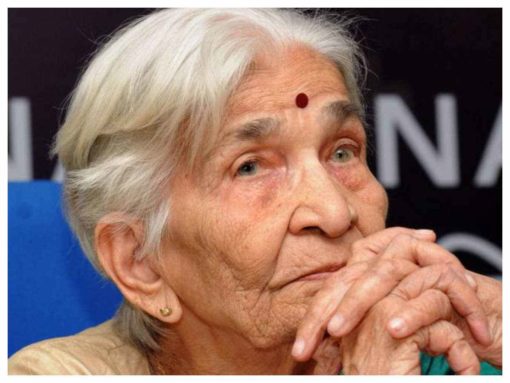
For someone who grew up watching Doordarshan in the 1970s and 80s, the song “Ek Chidiya Anek Chidiya” holds a very special place. It was a song that talked about unity in diversity in a way children could easily understand. The song is a part of the short animated film Ek, Anek aur Ekta, directed by Vijaya Mulay.
The renowned filmmaker, film historian, researcher and educationist passed away at her South Delhi residence on Sunday evening. She was 98. Vijaya’s daughter, actor Suhasini Mulay told The Indian Express that Mulay believed she lived a full and happy life and died of old age.
In 1940, after her husband’s transfer, Mumbai born Mulay had to move to Patna where she enrolled herself for a bachelor’s degree. On Sunday mornings there, she would go the city theatres to watch English films at discounted rates and that is how her long journey with cinema began.
Mulay received a scholarship in 1946 and went to the UK to pursue her master’s in education at the University of Leeds. She returned to Patna in 1949 and started actively working at the local film society. She moved to New Delhi in 1954, when the Government of India appointed her as an Education Officer.
In 1959, Vijaya became the founder of Delhi Film Society, after which she joined the Federation of Film Societies as joint secretary alongside film critic Chidananda Dasgupta with Satyajit Ray as its founding President. She also worked at the Central Board of Film Certification in early 1960s.
In 1967, Mulay met the celebrated French filmmaker Louis Malle in Kolkata during a visit from a French film delegation. This was the beginning of a life-long friendship and Malle, along with Satyajith Ray, assisted Vijaya in making her debut film The Tidal Bore. The 18-minute film about a natural phenomenon that wreaked havoc along the Hooghly, found its official entry in the Manheim Film Festival from India, and was also screened across the country by the Film Federation of India.
Mulay also received several prestigious awards including the V Shantaram Award for Lifetime Achievement for documentaries at the Mumbai International Film Festival in 2002 and Vikram Sarabhai Lifetime Achievement Award for educational communication in 1999.
She was also given the national award for best writing on cinema for her work, From Rajahs and Yogis to Gandhi and Beyond: Images of India in International Films of the Twentieth Century.
In 1975, Mulay headed the Center for Educational Technology (CET) where she made educational films which were broadcasted across 2400 villages in four languages. Ek, Anek aur Ekta was the first film from the animation studios of CET and it won the National Film award for Best Educational Film.
Mulay believed in a progressive, liberal and inclusive idea of India and Ek, Anek aur Ekta echoes those ideas. Through stories and songs, the seven minute animated film, released in 1974, talks about national integrity with more clarity and simplicity than our political leaders do today.
https://www.youtube.com/watch?v=a8DZUKQClvc
At this time of heightened electoral drama when all anyone can talk about is whether or not the “Divider in Chief” is coming to power again, let us not forget Mulay’s contribution in promoting the idea of a diverse but united nation. Let us remember the ideals her films upheld, she upheld.




